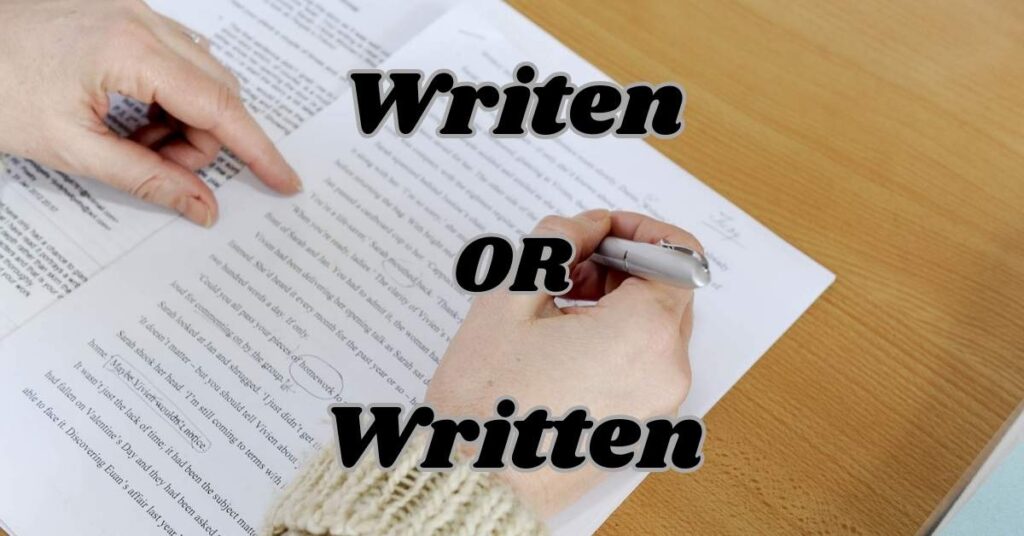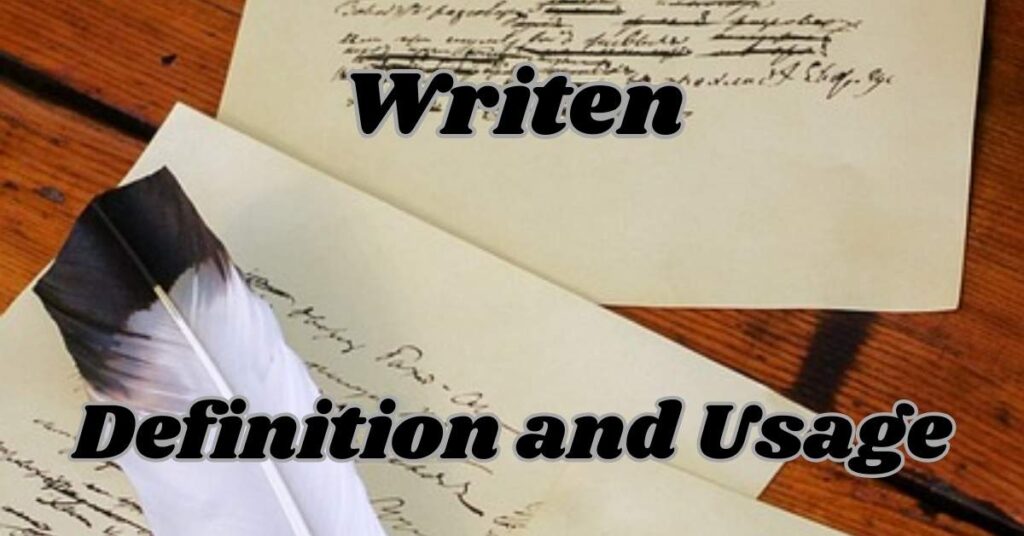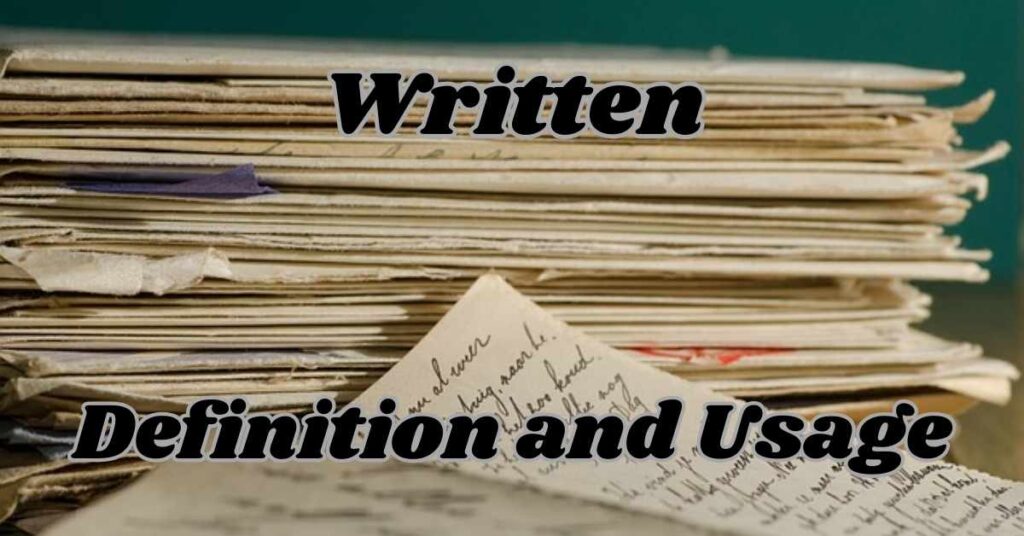Writen or Written can often confuse many people, leading to common mistakes in both casual and professional writing. While writen is simply a misspelled version of the correct term, written serves as the past participle of the verb write.
Understanding the difference between these two forms is crucial for clear communication, especially in contexts like legal documents and business writing.
Using the correct spelling not only reflects your attention to detail but also enhances your credibility as a writer. In this article, we will explore the meanings, usages, and common errors associated with Writen and Written, helping you navigate this frequent pitfall in English.
Quick Summary
The difference between Writen vsWritten is straightforward yet significant. Writen is an incorrect spelling of the past participle written, which comes from the verb write. Using the correct form is essential for effective communication, especially in professional settings like business reports and legal documents.
Misusing writen can lead to confusion and undermine your credibility, making it crucial to understand and apply the correct spelling in your writing.
Understanding Writen or Written

Writen does not hold any meaning in standard English. It is simply an incorrect spelling of the word written. Many people mistakenly use writen due to typing errors or lack of familiarity with grammar rules.
The correct term, written, is essential for conveying ideas accurately. When you write, especially in formal contexts like business reports or legal documents, using proper spelling and grammar is vital for maintaining professionalism.
Origins of the Written
The origins of written language trace back to ancient Mesopotamia, specifically the Sumerian civilization, which developed the first known writing system called cuneiform around 3200 BC. Initially, this system was used for recording economic transactions and keeping track of goods.
It evolved from simple pictographs into more abstract symbols. Writing systems also emerged independently in regions like Egypt, China, and Mesoamerica, showcasing the diverse evolution of human communication across cultures.
Cuneiform’s development marked a significant milestone in history, allowing for more complex record-keeping and communication.
Writen: Definition and Usage

Writen is an incorrect spelling of the word written. It does not hold any meaning in standard English and should be avoided in all forms of writing. The confusion often arises from typing errors or unfamiliarity with grammar rules.
Using writen instead of written can lead to misunderstandings and diminish the clarity of your communication, particularly in professional or academic contexts where precision is essential.
Writen Meanings
Since writen is a misspelling, it lacks any recognized meanings in English. It cannot be used correctly in any context, making it important to focus on using the correct term, written.
Misusing writen can confuse readers and detract from the overall message. To ensure effective communication, always double-check your spelling and grammar to avoid such common errors that can undermine your writing’s professionalism and clarity.
Uses of Writen in a Sentence
To illustrate how common mistakes occur, here are a few incorrect examples using writen:
- I have writen my report for class.
- The instructions were writen clearly.
- She has writen several articles on this topic.
- They had writen down the meeting notes.
- He will have writen his book by next year.
These examples show how easy it is to slip into using incorrect spellings if one is not careful.
Written: Definition and Usage

Written in the past participle of the verb write, indicating that something has been recorded or composed in text form. This term is widely used in various contexts, including literature, business documents, and legal contracts.
For example, you might say, “I have written a report,” which communicates that the action has been completed. Proper usage of written is crucial for effective communication and maintaining professionalism in writing.
Written Meanings
Written encompasses a range of meanings depending on the context. It can refer to anything from letters and articles to formal documents and contracts. In legal settings, for instance, a written agreement holds significant importance as it serves as a record of terms between parties.
Understanding these various meanings helps writers use written appropriately, ensuring clarity and precision in their communication across different fields and situations.
Uses of Written in a Sentence
Here are a few correct examples demonstrating how to use written properly:
- I have written my thesis on climate change.
- The contract was written by a legal professional.
- She has written several bestselling novels.
- The guidelines were written for clarity.
- They have written down their findings in a report.
These sentences highlight how important it is to use the correct form for clear communication.
Synonyms of Written
Understanding synonyms can enhance your vocabulary and help you express yourself more clearly. Here are a few synonyms for written:
- Inscribed
- Recorded
- Documented
- Composed
- Authored
- Drafted
- Noted
- Penned
- Scripted
- Transcribed
Using these synonyms appropriately can add variety to your writing while maintaining clarity.
Side by Side Comparison
| Term | Correctness | Usage Context |
| Writen | Incorrect | No recognized usage |
| Written | Correct | Past participle of write |
This table clearly shows that only writing holds value in standard English usage.
Everyday Usage Examples

In everyday communication, the word written frequently appears in various contexts. For instance, you might say, “The instructions are written on the back of the box,” or “I have written a reminder for our meeting.”
These examples illustrate how written is used to convey completed actions or provide information. Proper usage of written enhances clarity and ensures that your message is easily understood by the reader.
Writen Example in Context
Imagine someone saying, “I have writen my homework.” This incorrect usage of writen can confuse listeners and reflect poorly on the speaker’s attention to detail. In casual conversation, such errors may seem minor, but they can undermine credibility in professional settings.
Therefore, it’s essential to be mindful of spelling and grammar to maintain clarity and professionalism in all forms of communication.
Written Example in Context
Consider a scenario where someone states, “I have written my application for the job.” This correct use of written communicates that the action is complete and conveys professionalism.
In formal contexts like job applications or reports, using written accurately demonstrates attention to detail and enhances the overall quality of communication. Such clarity is vital for making a positive impression in both personal and professional interactions.
Tips to Avoid Mistakes

To ensure you avoid common errors like using writen, consider these tips:
- Always check your spelling before submitting any written work.
- Use grammar-checking tools to catch mistakes.
- Familiarize yourself with common verb forms to enhance your writing skills.
- Read your writing out loud; this helps catch errors that may go unnoticed.
- Practice using both terms correctly in sentences to reinforce understanding.
By following these tips, you can improve your writing precision significantly.
More Article: Hans’s or Hans’: What’s the Difference?
FAQs: Writen or Written
Is it correct to say “written”?
Yes, “written” is the correct term, serving as the past participle of the verb “write.”
Which is correct, written or writen?
“Written” is correct; “writen” is a misspelling and should be avoided in writing.
What is the spelling of writing and written?
The correct spellings are “writing” for the present participle and “written” for the past participle.
What is the past tense of write?
The past tense of “write” is “wrote,” while “written” is its past participle form.
Conclusion
Understanding the difference between Writen or Written is essential for clear and effective communication. While writen is simply a misspelling with no recognized meaning, written serves as the correct past participle of the verb write.
Using the proper term not only enhances your writing but also reflects your professionalism, especially in formal contexts like business and legal documents. By being mindful of spelling and grammar, you can avoid common mistakes and ensure your message is conveyed accurately and confidently.
Related Post: Purposed vs Proposed: What’s the Difference?

